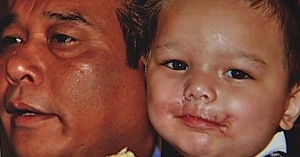Only Cop Charged in Raid That Maimed a Baby Is Acquitted -- Police Still Blaming Toddler & Familyby William Norman GriggThe Free Thought Project Dec. 15, 2015 |
Popular 
Claim Jewish Student Was 'Stabbed In The Eye' by Pro-Palestine Protester Draws Mockery After Video Released

Senate Passes $95B Giveaway to Israel, Ukraine, and Taiwan, Combined With TikTok Ban

Biden Signs Bill to Give $95B to Israel, Ukraine and Taiwan, Ban TikTok

Mistrial Declared in Case of Arizona Rancher Accused of Killing Migrant Trespasser

'These Protesters Belong in Jail': Gov. Abbott Cheers Arrest of Pro-Palestine Protesters at UT Austin
  "How is America going to justify this?" exclaimed Bounkham Phonesavankh after a federal jury in Georgia acquitted the former sheriff's deputy whose perjured affidavit precipitated a SWAT raid that nearly cost the life of his 19-month-old son. "How is America going to justify this?" exclaimed Bounkham Phonesavankh after a federal jury in Georgia acquitted the former sheriff's deputy whose perjured affidavit precipitated a SWAT raid that nearly cost the life of his 19-month-old son."How can we explain this? I thought this country was built with the truth, and not a bunch of corruption and lying like this. I almost lost my life, my family, my son." Phonesavankh's namesake son, known by the nickname Bou-Bou, was nearly burned to death in his sleep by a flash-bang grenade hurled into his crib during a 2:00 a.m. no-knock SWAT raid by the Habersham County Sheriff's Office on their home in Cornelia in May 2014. The search warrant used to justify that raid was filed by then-Deputy Nikki Austin, who claimed that a "true and reliable informant" had conducted a controlled buy of $50 worth of crystal meth at the home several hours earlier from a potentially dangerous repeat offender named Wanis Thonetheva. The affidavit characterized Thoneteheva as armed and potentially dangerous, and claimed that lookouts had been stationed at the home -- elements that supposedly justified a militarized midnight raid on a home where children were known to reside. Every critical element of Austin's affidavit was either a conscious lie or a culpable misrepresentation. Her "true and reliable" informant began working with the Mountain Judicial Circuit Criminal Narcotics Investigation and Suppression Team the day before the nearly fatal SWAT raid on the Phonesavanh family, which means that he had not proven his reliability. He claimed to have attempted a drug buy while in the company of his wife and roommate, neither of whom was working with the task force, and it was the roommate -- not the informant -- who supposedly made the purchase. As Autry later testified in court, she wasn't even the primary author of the affidavit, which was drafted by her supervisor. During her trial, Autry maintained that she didn't lie, while conceding that some of the information in the affidavit wasn't "entirely" accurate. Literally thousands of people are in federal prison because of genuinely trivial inaccuracies in stories they told federal investigators. As a member of the privileged enforcement caste, however, Autry was spared punishment because the applicable legal standard required the prosecution to demonstrate that she acted "willfully" and with "reckless disregard" for the truth -- and, more importantly, the prosecution had to overcome the reflexive deference to law enforcement that characterizes American juries, especially at the federal level. Alecia Phonesavankh, the mother of the still-recovering child, believes that Autry's acquittal -- like the grotesque display of military force in the terrifying home invasion raid — reflects deeply entrenched racial bias toward her Laotian husband, in-laws, and child. "It's obvious I was the only person untouched in that house when they raided it," Alecia said through angry tears following the verdict. "Why? Because I'm white. Why do they target Laotians and not me? Because I'm white. Why did we get a not guilty verdict? Because she [former Deputy Austin] is white!" Another possible explanation is found in the carefully designed mechanisms that diffuse responsibility and impede accountability. Within hours of the raid, while Bou-Bou was in a medically induced coma as doctors struggled to stitch his chest back together, Habersham County Sheriff Joey Terrell issued a statement exonerating his officers of all misconduct. "I stand behind what our team did," Terrell declared after consulting with the county DA' s office and the Georgia Bureau of Investigation. "There's nothing to investigate, there's nothing to look at. Bad things can happen. That's just the world we live in." Public outrage eventually led to a Grand Jury inquest, which did little more than ratify the sheriff's claims. Rather than preferring charges against the officials responsible for that crime, the grand jury suggested a handful of anodyne "reforms" and expressed satisfaction that the rouge task force that carried out the berserker raid has been subsumed into a state-wide counter-narcotics unit supervised by the Georgia Bureau of Investigation. The grand jury's "presentment" underwent exceptionally strenuous rhetorical contortions to apportion roughly equal amounts of blame to both the perpetrators and the victims of the atrocity committed against the Phonesavankh family. "Nothing can be more difficult and heart-wrenching than injuries to one's child," the document asserts, before suggesting that inflicting such injuries can be just as traumatic as suffering them: "[W]e wish to extend our sympathy also to the law enforcement officers involved... [W]hat has not been seen before by others and talked or written about, is that these individuals are suffering as well." While admitting that the investigation that produced the search warrant affidavit was "hurried, sloppy, and unfortunately not in accordance with the best practices and procedures," the Habersham County Grand Jury asserted that this wasn't a case of "criminal negligence," but simply a regrettable result of "well-intentioned people getting in too big a hurry, and not slowing down and taking enough time to consider the possible consequences of their actions." This isn't to say that both parties were equally blameless. Page 13 of the Grand Jury's presentment actually blames "the parents and extended family" of the victim, because they supposedly "had some degree of knowledge concerning family members involved in criminal activity that came in and out of the residence." The alleged target of the raid, Wanis Thonethevah, had been thrown out of the home three weeks earlier. Bou-Bou's parents had relocated to Cornelia after their home in Wisconsin had burned down, and had nothing whatsoever to do with any alleged wrongdoing of their relative; they were simply desperate for a place to live. Their only role in this affair consisted of sleeping in a home that was targeted for a post-midnight military assault on the basis of a perjured affidavit. In their reply to the Phonesavankh family's lawsuit, the Habersham County Sheriff's Office actually claimed that the "deliberate, criminal conduct of plaintiffs" -- including the lead plaintiff, Bou-Bou -- "supersedes any and all negligence or liability, if any, on the part of these defendants," and that "plaintiffs' damages, if any, were directly and proximately caused by the contributory and comparative negligence of plaintiffs and their failure to exercise ordinary care." How could Bou-Bou's parents "exercise ordinary care" sufficient to prevent a team of militarized narcotics enforcers from breaking into their home and nearly murdering their 19-month-old infant in his sleep, on the basis of a perjured affidavit? Given that the primary victim was also the lead plaintiff, the reply filed by the Sheriff's Office actually accuses him of "negligence" and "criminal conduct," presumably for the felonious act of sleeping in a crib into which a privileged public servant would soon hurl a flash-bang grenade. "Qualified immunity" protected Habersham County Sheriff's Deputy Charles Long from legal consequences for blindly heaving that flash-bang grenade -- a "destructive device," as described by the ATF, that when detonated burns at 2,000-3,500 degrees Fahrenheit -- into Bou-Bou's crib. During Nikki Austin's trial, defense attorney Michael Trost made what could be called an Oprah Winfrey argument on behalf of his client: Sheriff Terrell has qualified immunity; Deputy Long has qualified immunity; everybody gets qualified immunity! "There's a pattern of excess in the ways search warrants are executed," Trost complained. "That's what led to the injuries to this child." Because everybody was guilty of excess, in other words, nobody is to blame -- except for the unprivileged victims of that institutionalized excess. "I was doing my job," Austin crowed after the verdict, as if expecting a commendation. Her "job" was one that required neither honesty nor accuracy, and involved no personal accountability for the crimes committed against an infant who will endure years of expensive surgeries and remain disfigured for life. |



